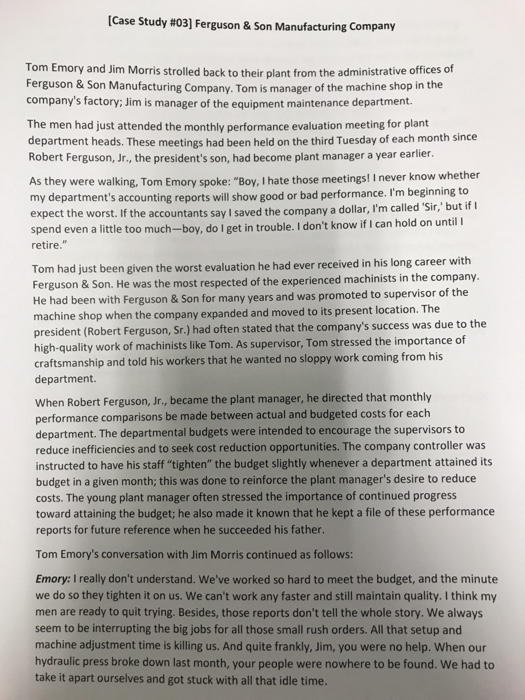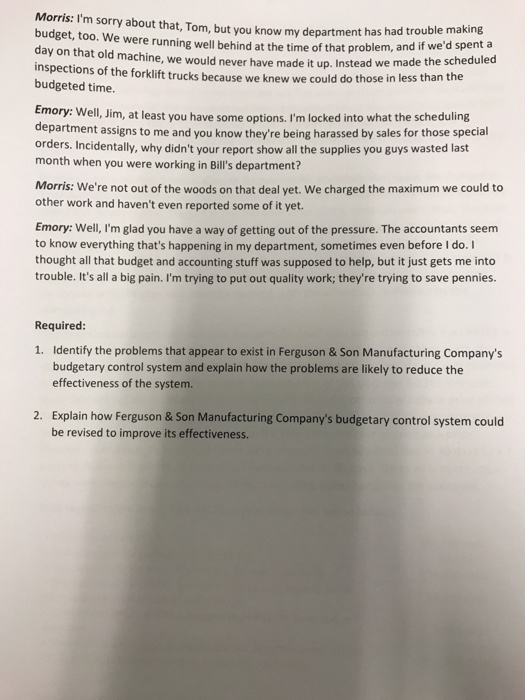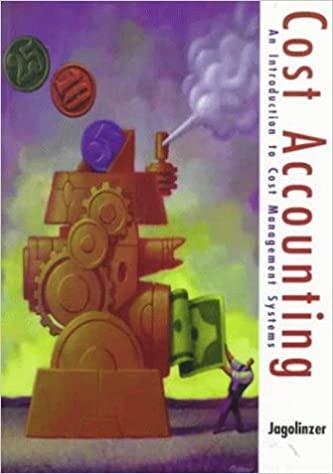Case Study #03] Ferguson & Son Manufacturing Company Tom Emory and Jim Morris strolled back to their plant from the administrative offices of Ferguson & Son Manufacturing Company. Tom is manager of the machine shop in the company's factory; Jim is manager of the equipment maintenance department. The men had just attended the monthly performance evaluation meeting for plant department heads. These meetings had been held on the third Tuesday of each month since Robert Ferguson, Jr., the president's son, had become plant manager a year earlier As they were walking, Tom Emory spoke: "Boy, I hate those meetings! I never know whether my department's accounting reports will show good or bad performance. I'm beginning to expect the worst. If the accountants say I saved the company a dollar, I'm called spend even a little too much-boy, do l get in trouble. I don't know if I can hold on until l retire." Sir,' but if I Tom had just be erguson & Son. He was the most respected of the experienced machinists in the company He had been with Ferguson & Son for many years and was promoted to supervisor of the machine shop when the company expanded and moved to its present location. The president (Robert Ferguson, Sr.,) had often stated that the company's success was due to th high-quality work of machinists like Tom. As supervisor, Tom stressed the importance of craftsmanship and told his workers that he wanted no sloppy work coming from his department en given the worst evaluation he had ever received in his long career with When Robert Ferguson, Jr, became the plant manager, he directed that monthly performance comparisons be made between actual and budgeted costs for each department. The departmental budgets were intended to encourage the supervisors to reduce inefficiencies and to seek cost reduction opportunities. The company controller was instructed to have his staff "tighten" the budget slightly whenever a department attained its budget in a given month; this was done to reinforce the plant manager's desire to reduce costs. The young plant manager often stressed the importance of continued progress toward attaining the budget; he also made it known that he kept a file of these performance reports for future reference when he succeeded his father Tom Emory's conversation with Jim Morris continued as follows: Emory: I really don't understand. We've worked so hard to meet the budget, and the minute we do so they tighten it on us. We can't work any faster and still maintain quality. I think my men are ready to quit trying. Besides, those reports don't tell the whole story. We always seem to be interrupting the big jobs for all those small rush orders. All that setup and machine adjustment time is killing us. And quite frankly, Jim, you were no help. When our hydraulic press broke down last month, your people were nowhere to be found. We had to take it apart ourselves and got stuck with all that idle time








